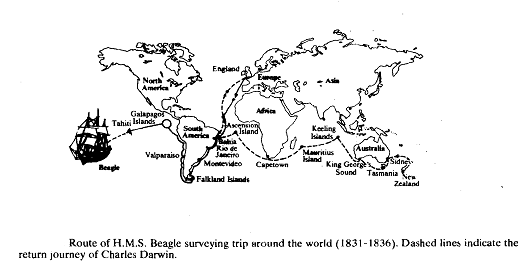Darwin and Natural Selection:
The English naturalist Charles Darwin (1809-1882) explained how biological evolution took place, in his remarkable "The Origin of Species" in 1859. Darwin began his observations at the age of 22, as a naturalist on H.M.S. Beagle, which was a sail ship going round the world. He spent five advent~irous years on the voyagc. During this period, he visited may islands of the Atlantic Ocean, some parts of the coasts of South America, and some islands of the South Pacific, of which the Galapagos is the most important. This journey gave Darwin a prolonged exposure to an area of the world, radically different in its plant and animal life from his native place. He collected and preserved a lot of material and took extensive notes throughout the voyage.

Once back in England, he spent nearly 22 years examining his collection and pondering over the question of how evolution of species could have taken place. He drew the evidence from three important areas: the record of the rocks, in which he discovered fossils and imprints of creatures of the past ages; the distribution of animals and plants in the world; and finally from the study of the breeding experiments that were going on in the nineteenth century to improve life stock or to breed dogs and pigeons. Darwin's great innovative step was to introduce the theory of 'natural selection' as the mechanism for evolution.
Though the credit for giving this theory* is generally given to Darwin, another English naturalist-Alfred Russel Wallace had conceived the theory of evolution independently at'the same time. The work of the two scientists was presented 'jointly at the meeting of the Linnean Society in London in 1858. The theory began with two observations. First. more organisms are born than can survive to reproduce: themselves, because the environment has limited means of subsistence. This overproduction results in a struggle for existence and ultimate survival of the fittest. Plant and animal species compete within and among themselves for food, water, air, light-everything that enables organisms to survive and reproduce.
The second observation is that offsprings, i.e, children differ slightly from their parents and from each other in characteristics which they inherit. This we now call genetic variation. Darwin held the view that these variations are a source of evolutionary change. According to him in any group, individuals with characteristics which enable them to adapt best to their environment survive and reproduce, while those who lack these characteristics have a poor chance of survival. Thus, Nature selects and preserves the useful variations in a changing environment, Darwin called this natural selection.